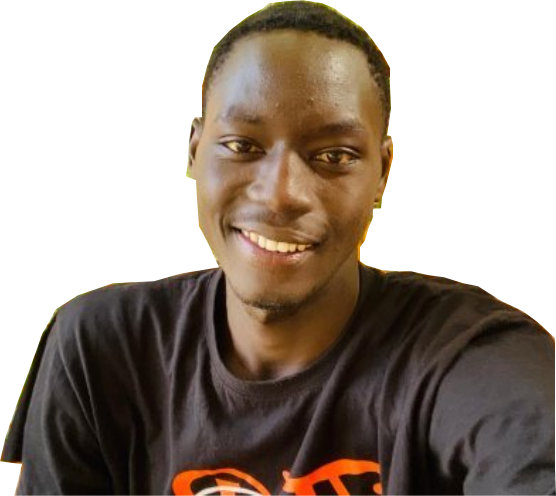An Interview with Angufibo Lincoln A Full Stack Developer
For the month of September we definitely have an Application focus. To go with this theme,
we thought is would be great to interview a young man that is at the cutting edge of software
development. For the first section (which we call Under The Scope) of the magazine, you
noticed that we talked about Jumia while in the second section (On The Scale) we talked
about Safe Boda. It therefore makes sense that we devote a section of the month’s magazine
on the subject of the actual design of application of these kinds and some of the minds
that are behind the development of these apps.
So we present an interview that was done with Lincoln Angufibo. A young man the editor
met online on Twitter but who we later connected with at a Data Science meetup organized
by Data Science Network Nigeria in collaboration with Outbox Hub.
1. What is your name?
My name is Angufibo Tonny Lincoln
2. Where are you from?
Well I am a Lugbara by tribe born in Arua district. However, I grew up in the
central region in areas of Entebbe and Nsambya where I am currently residing.
3. Where did you go to school?
I attended St. Peter’s Primary school Nsambya for my primary level from there I
joined Brilliant High School Kawempe for my Ordinary and Advanced Levels of Education.
After my high school, I joined Smart Up Factory for a boot camp in software development
where I graduated as a full stack JavaScript engineer, a foundation for my career.
4. Do you have a degree if so in what?
No, I don’t hold any university degree. I literally joined a software development boot
camp where I developed my skills from and for this, I consider my experience as my
degree. It’s been a journey of learning and acquiring senior mentorship from various
industrial experts that I have met along the way and programs that I have enrolled in
something that has facilitated my growth as an individual and my career.
5. Where do you work?
Currently am employed with a company providing digital banking and payment
solutions across Africa
6. What does your work involve?
My work is lined along software engineering and this involves developing, deploying,
testing and maintaining software programs or applications using different tools ranging
from programming languages, libraries and frameworks.
7. What do you like the most about your place of work?
Well, I would rather reply this in the sense “what do I love about my profession”
because workplaces often change. However the most special thing is room to create
solutions to problems affecting communities using technology. Helping communities grow
in different spheres of life ranging from economic, health and social arenas.
Creating software solutions is my core reason why I everyday sit on my laptop and write
code. Furthermore, this profession has bridged a gap for me to know different brilliant
people who have inspired me, from whom I have greatly learned many things in my life
and become family to me because I believe family is not all about blood but anyone
willing to give you a hand when you need it most.
8. What are the most important skills that every coder must have?
Currently, there is really a great shift on how teams work and roles individuals play
while working so entirely you will never find one person working on everything alone.
Most cases there is going to be backend engineers building backend APIs, frontend
engineers building the user interface, software testers, DevOps engineers, scrum masters,
team leads, database engineers and many others and all these people playing different
roles are required for a great software development team. So skills really vary depending
on someone, however to me I think some of the common key skills include;
•Having a solid understanding of programming language they choose to learn
because computer programming languages are the fundamentals of software
engineering. One of the most popular programming languages today are, python,
JavaScript, Java, PHP, Golang, Kotlin, Rust etc
•Understanding data structures and algorithms since they are the building blocks of
software. This is a topic that is greatly interviewed in any software engineering job
because without knowledge of these, one can’t write real-world applications.
•Knowing version control with Git and GitHub a popular collaborating tool among
software development teams.
•Knowledge of databases as these help in storage of data. Most of the software
applications existing today have a database storing user-data so a strong foundation
working with databases is highly required. Popular databased include Mongo DB,
MySQL, PostgreSQL, Cassandra. Well this aspect is generally great for backend
engineers because most cases they interact with databases.
•Good communication skills both oral and written. Most of the time software
development projects require multiple people to work together so effective
communication very key.
•Ability to work in a team of professionals from different backgrounds
•Writing clean and efficient code through optimization
•Software testing and debugging. During development phase, all software
components or modules performing different functionalities have to be tested out
before production. Also errors usually come up due to certain mistakes since
humans are not machines , so easily locating were an error is from and fixing it is
what is called debugging
•Knowledge of agile methodology. Well most of the companies have gone agile and
they are developing and shipping software products using agile methodology. So
having knowledge of agile principles is really so important if you are to work on a
team.
9. What other skills are you aiming at getting and why?
Currently am focusing on developing skills in data engineering and machine learning.
This is because there is a lot of data that is being generated by organizations and so highly
competent data engineers are needed to design and build systems for collecting, storing,
and analyzing big data. Secondly since many organizations are data-driven, there is need
to draw insights from the data generated to meet the business objectives. Therefore a data
engineer works closely with data analysts and data scientists and this requires them to
have good knowledge of how to design efficient machine learning models.
I am also greatly understanding human centered design, a methodology that provides a
solution best approach to solving problems in our communities and this entirely cuts
across all domains that are centered on problem solving. So for whatever solution is
built, builders or innovator must put the people first they are building for and by
considering this, it’s when we can actually come up with solutions that meet the actual
needs of the people we are building for.
10. What do you think are the opportunities in the technology industry in
Uganda? Africa?
With the big rise of enterprises using technology, there is high demand for
competent problem solvers to take up roles in different domains. More so, many
companies that outsource software engineers have come up to connect local
engineers to international clients. Such companies include Tunga.io. This enables
generation of incomes enabling sustaining a living. All in all, becoming a software
developer is worth investing in.
11. What are some of the best meetups that you have attended and why?
Some of the best developer meetup I monthly attend here in Kampala is
Python Kampala Meetup (PyKla) and so many developer summits like the annual
Open Source Community Africa Summit (OSCA-Kampala). Python Kampala is
monthly meet up for engineers who code in python. The reason why I constantly
attend these meet ups and summit is that I get to learn a lot and discover concepts
facilitating my growth. More so, well I get to network with a bunch of brilliant
engineers doing different things.
12. What plans do you have for the future?
One of the major aspects I have in mind for the future is starting my own company
which will greatly employ human centered design principles as a means to work with
organizations, companies, and many social enterprise schemes seeking growth, influence
and agility to design and build innovative solutions that are researched, analyzed and
tested for their success.


Comments
Post a Comment